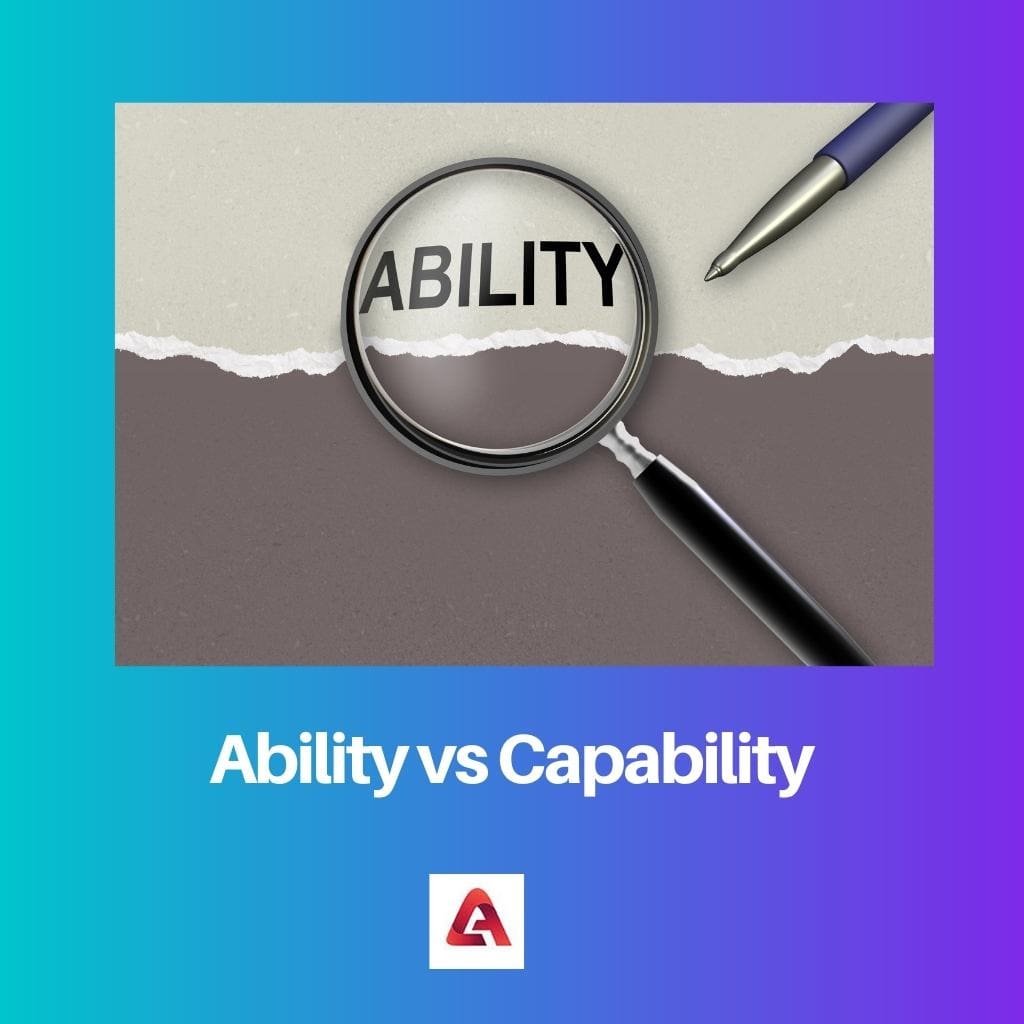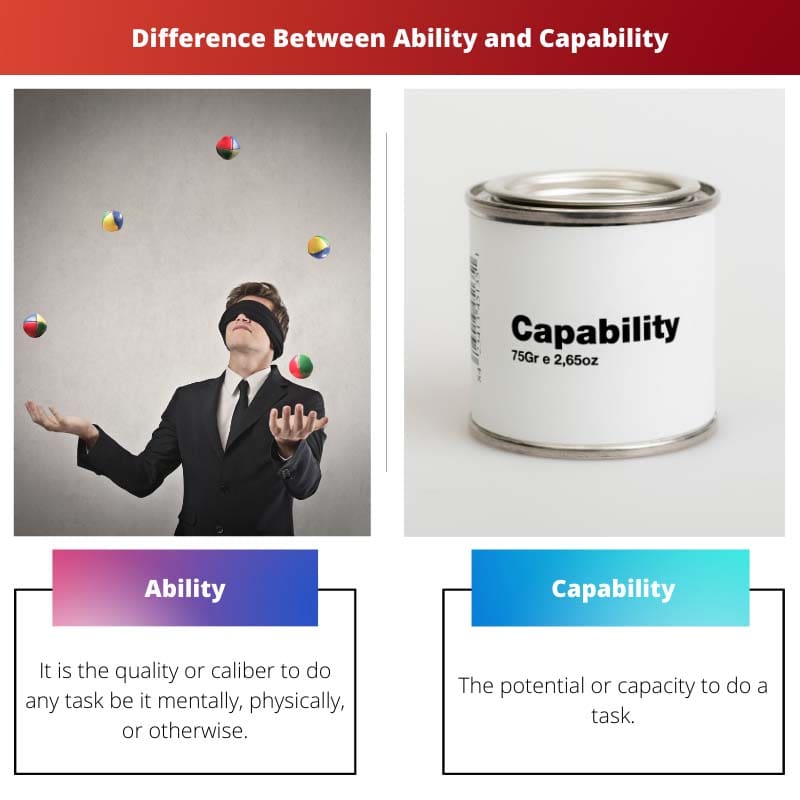“Ability” refers to one’s inherent skill or proficiency in a specific task, developed through experience or training. On the other hand, “capability” encompasses a broader range, incorporating both innate and acquired traits, including potential and adaptability. While ability is more task-specific, capability reflects a person’s overall capacity to handle various challenges and tasks.
Key Takeaways
- Ability refers to possessing a skill or competence to perform a particular task, while capability refers to the potential or aptitude to learn or acquire a skill.
- Ability is specific and based on acquired skills, while capability is more general and focuses on the potential to acquire new skills.
- Ability is the manifestation of a skill that can be demonstrated, while capability is the inherent capacity to learn a skill and adapt to new situations.
Ability vs. Capability
Ability refers to existing skills in a person. It also covers their knowledge in a certain area and their proficiency level. Capacity is a person’s potential or capability to do something, regardless of whether they have already developed the skills and knowledge necessary.

Comparison Table
| Feature | Ability | Capability |
|---|---|---|
| Definition | The power or natural aptitude to do something. | The potential or capacity to do something. |
| Focus | Inherent quality of a person, thing, or system. | Potential or potential range of what can be done. |
| Degree of certainty | Less certain, emphasizes potential or possibility. | More certain, emphasizes capacity or potential that can be developed or utilized. |
| Examples | * “She has the ability to run a marathon.” (Focuses on inherent potential) * “This phone has the ability to take underwater photos.” (Focuses on potential functionality) | * “The company has the capability to produce 1000 units per day.” (Focuses on developed potential) * “The new software has the capability for advanced data analysis.” (Focuses on potential for further development) |
| Usage | Often used when referring to natural talents, skills, or potential. | Often used when referring to developed skills, capacities, or potential that can be utilized. |
What is Ability?
Ability refers to an individual’s inherent capacity to perform specific tasks, demonstrating a level of proficiency or skill in a particular area. It is a multifaceted concept influenced by various factors such as genetics, experience, training, and natural talent. Abilities can manifest across cognitive, physical, or interpersonal domains, showcasing the diverse range of human capabilities.
Components of Ability
1. Inherent Traits:
- Genetic Influences: Certain abilities may have a genetic basis, impacting cognitive functions, physical prowess, or predisposition to certain skills.
- Natural Talents: Individuals may possess innate talents, facilitating easier mastery in specific activities.
2. Learned Skills:
- Education and Training: Formal education, specialized training, or experiential learning can significantly enhance and develop specific abilities.
- Practice and Experience: Regular engagement and practice in a particular field contribute to honing abilities over time.
Types of Abilities
1. Cognitive Abilities:
- Analytical Skills: The capacity for critical thinking, problem-solving, and decision-making.
- Memory: The ability to retain, recall, and apply information.
2. Physical Abilities:
- Strength and Endurance: Physical prowess and the capacity to endure strenuous activities.
- Coordination and Dexterity: Precise control of body movements.
3. Interpersonal Abilities:
- Communication Skills: Effectively conveying ideas, actively listening, and interpreting non-verbal cues.
- Collaboration: The ability to work harmoniously with others towards common goals.
Developing and Enhancing Abilities
1. Continuous Learning:
- Adaptability: Embracing new information and evolving in response to changing circumstances.
- Skill Acquisition: Pursuing education and experiences to broaden and deepen existing abilities.
2. Personalized Growth Strategies:
- Self-Awareness: Recognizing one’s strengths and weaknesses to tailor development efforts effectively.
- Goal Setting: Establishing clear objectives to guide the enhancement of specific abilities.

What is Capability?
Capability, in its essence, denotes the comprehensive capacity of an individual, system, or entity to perform a range of tasks, tackle challenges, and adapt to dynamic environments. Unlike specific skills or aptitudes, capability encompasses a broader spectrum, taking into account diverse attributes that contribute to overall effectiveness.
Components of Capability
1. Skill Diversity and Proficiency
Capability is underpinned by an array of skills across multiple domains. Proficiency in various disciplines allows an entity to navigate complex scenarios and address challenges holistically. This includes technical skills, interpersonal abilities, and problem-solving acumen.
2. Adaptability and Flexibility
A key aspect of capability lies in its adaptability to evolving circumstances. Individuals or systems with high capability can adjust their approaches, strategies, and methodologies in response to changing environments. This dynamic quality distinguishes capability from static, task-specific abilities.
3. Resource Utilization
Effective resource management is integral to capability. This involves optimizing available resources, whether they be time, personnel, or technology, to achieve objectives efficiently. A highly capable entity can maximize output while minimizing resource input.
4. Innovation and Creativity
Capability extends beyond routine tasks and embraces innovation. Individuals or systems with robust capability demonstrate creativity in problem-solving, introducing novel ideas and approaches to overcome challenges. This element fosters continuous improvement and resilience.
5. Collaboration and Interconnectivity
The ability to collaborate seamlessly and integrate various components contributes significantly to capability. Whether in a team or systemic context, entities with high capability can synergize diverse elements for enhanced performance and outcomes.
Evaluating and Developing Capability
1. Assessment Metrics
Measuring capability involves evaluating a combination of quantitative and qualitative metrics. This includes performance indicators, adaptability assessments, and feedback mechanisms to provide a comprehensive understanding of an entity’s overall capacity.
2. Continuous Learning and Development
Enhancing capability requires a commitment to ongoing learning and skill development. Individuals and organizations can invest in training programs, mentorship initiatives, and exposure to diverse experiences to bolster their range of competencies.
3. Cultivating a Culture of Capability
In an organizational context, fostering a culture that values and prioritizes capability is crucial. This involves promoting collaboration, innovation, and continuous improvement as integral components of the entity’s identity.

Main Differences Between Ability and Capability
- Scope:
- Ability: Specific, task-oriented proficiency in a particular skill or domain.
- Capability: Encompasses a broader range, incorporating various skills, attributes, and adaptability across multiple domains.
- Static vs. Dynamic:
- Ability: Tends to be more static, focusing on individual skills developed through experience or training.
- Capability: Dynamic, allowing for adaptability and the integration of diverse skills to address a variety of challenges.
- Comprehensiveness:
- Ability: Specific and targeted to a particular context or task.
- Capability: Comprehensive, considering an entity’s overall capacity, including skills, adaptability, resource management, and innovation.
- Application:
- Ability: Applied to specific tasks or functions.
- Capability: Applicable across a spectrum of tasks, emphasizing a holistic approach to problem-solving and performance.
- Development:
- Ability: Developed through focused training and experience in a specific area.
- Capability: Involves the ongoing development of diverse skills, fostering adaptability, innovation, and collaboration.
- Evaluation:
- Ability: Assessed based on proficiency in a defined skill set.
- Capability: Evaluated through a combination of quantitative and qualitative metrics, considering adaptability, resource management, and overall performance.




